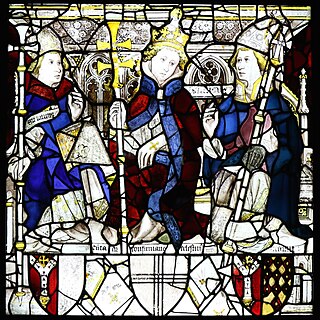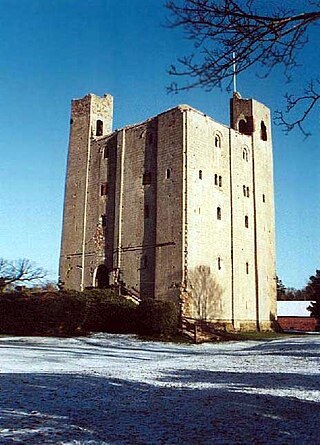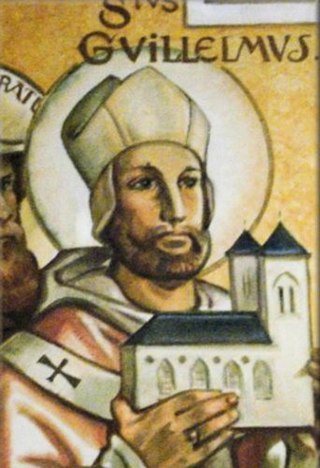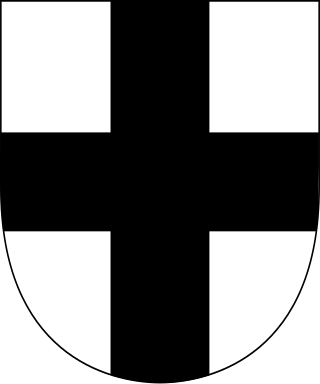External links
- medievalists.net - When England was under Interdict
- Catholic Herald - The last lockdown: 13th-century England’s six years without Mass
The Papal Interdict of 1208 was an interdict laid on England and Wales by Pope Innocent III which generally enforced the closure of the churches, forbade the administration of the Catholic sacraments, and prohibited the use of churchyards for burials. Issued on 23 March 1208, the interdict lasted for more than six years until it was lifted on 2 July 1214.
Pope Innocent III placed the Kingdom of England under an interdict after King John refused to accept the pope's appointee, Stephen Langton, as Archbishop of Canterbury.

Otto IV was the Holy Roman Emperor from 1209 until his death in 1218.

Pope Celestine II, born Guido di Castello, was head of the Catholic Church and ruler of the Papal States from 26 September 1143 to his death in 1144.

Pope Celestine III, was the head of the Catholic Church and ruler of the Papal States from 30 March or 10 April 1191 to his death in 1198. He had a tense relationship with several monarchs, including Emperor Henry VI, King Tancred of Sicily, and King Alfonso IX of León.

Pope Innocent III, born Lotario dei Conti di Segni, was the head of the Catholic Church and ruler of the Papal States from 8 January 1198 until his death on 16 July 1216.

Stephen Langton was an English cardinal of the Catholic Church and Archbishop of Canterbury from 1207 until his death in 1228. The dispute between King John of England and Pope Innocent III over his election was a major factor in the crisis which produced the Magna Carta in 1215. Langton is also credited with having divided the Bible into the standard modern arrangement of chapters used today.

Year 1208 (MCCVIII) was a leap year starting on Tuesday of the Julian calendar.
John de Gray or de Grey was an English prelate who served as Bishop of Norwich, and was elected but unconfirmed Archbishop of Canterbury. He was employed in the service of Prince John even before John became king, for which he was rewarded with a number of ecclesiastical offices, culminating in his pro forma election to Norwich in 1200. De Gray continued in royal service after his elevation to the episcopate, lending the King money and undertaking diplomatic missions on his behalf. In 1205 King John attempted to further reward de Gray with a translation to the archbishopric of Canterbury, but a disputed election process led to de Gray's selection being quashed by Pope Innocent III in 1206.
In Catholic canon law, an interdict is an ecclesiastical censure, or ban that prohibits certain persons or groups from participating in particular rites, or that the rites and services of the church are prohibited in certain territories for a limited or extended time.
Eustace was the twenty-third Lord Chancellor of England, from 1197 to 1198. He was also Dean of Salisbury and Bishop of Ely.

Raymond VI was Count of Toulouse and Marquis of Provence from 1194 to 1222. He was also Count of Melgueil from 1173 to 1190.

Aubrey de Vere, 2nd Earl of Oxford, hereditary Master Chamberlain of England, served in military campaigns under King Richard and King John. He was succeeded in the earldom by his brother, Robert de Vere, 3rd Earl of Oxford.

Peter of Capua was an Italian scholastic theologian and prelate. He served as cardinal-deacon of Santa Maria in Via Lata from 1193 until 1201 and cardinal-priest of San Marcello al Corso from 1201 until his death. He often worked as a papal legate. He wrote several theological works and was a patron of his hometown of Amalfi.
The Poor Catholics were an early Catholic mendicant order, organized in 1208 and of short duration. Recruits were taken from the Pauperes Lugdunenses ; the distinguishing name was given by Pope Innocent III.
Simon Langton was an English medieval clergyman who served as Archdeacon of Canterbury from 1227 until his death in 1248. He had previously been Archbishop-elect of York, but the election was quashed by Pope Innocent III.
Mauger was a medieval Bishop of Worcester.
Events from the 1200s in England.

Guillaume de Donjeon was a French Roman Catholic prelate who served as the Archbishop of Bourges from 1200 until his death. He served as a canon in Soissons and Paris before he entered the Order of Grandmont. Sometime later he entered the Cistercians. He was known to practice austerities such as abstaining from meat and wearing a hair shirt.
William the Clerk of Normandy was a Norman cleric and Old French poet. He is not the same person as the Scoto-Norman poet William the Clerk, who wrote the Roman de Fergus, sometimes wrongly attributed to the Norman.

Dietrich I von Hengebach was the Archbishop of Cologne. He was elected in 1208. He supported Otto of the House of Welf as Holy Roman Emperor and was excommunicated in 1212 by Innocent III. Upon his excommunication, he lost the Episcopal see and he brought suit in Rome. His suit was rejected in 1215, after which he retired to the Deanery of Saint Apostles in Cologne, where he died after 1223.
The Venetian Interdict of 1606 and 1607 was the expression in terms of canon law, by means of a papal interdict, of a diplomatic quarrel and confrontation between the Papal Curia and the Republic of Venice, taking place in the period from 1605 to 1607. While it was active, the Interdict saw expulsions of some religious orders from Venice, a pamphlet war, and intense diplomacy by France and Spain to resolve the issue. Paolo Sarpi was one of the most prominent Venetian figures involved in the interdict.